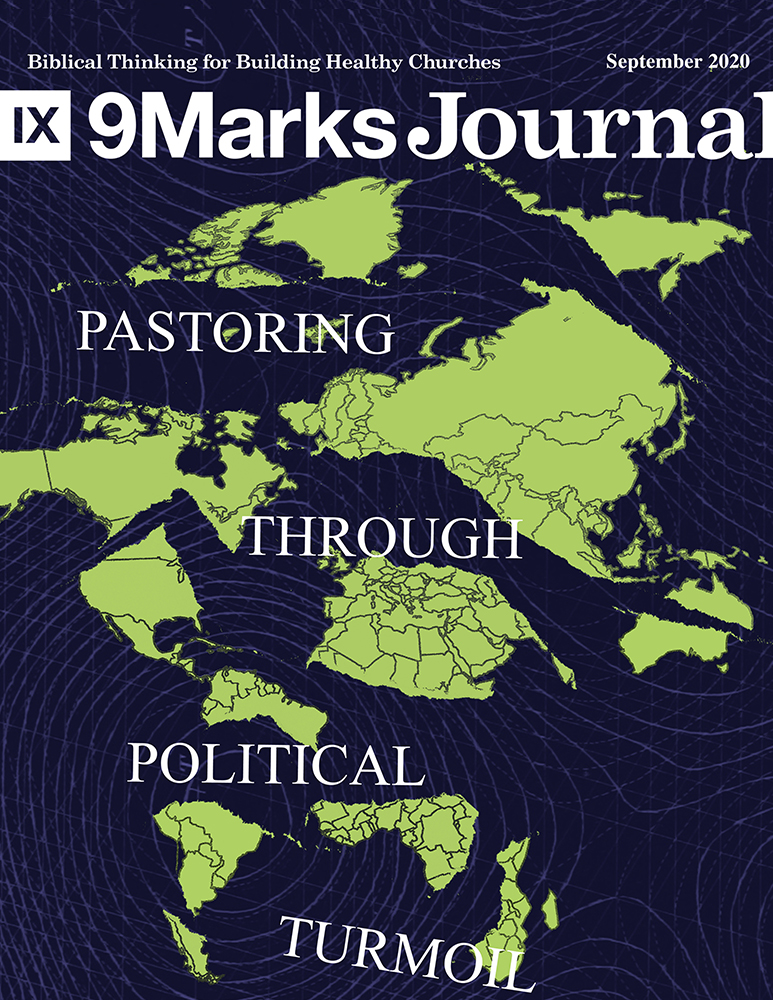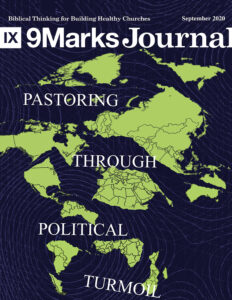
Pastoring Through Political Turmoil
Learning from Scripture and History on Pastoring in Political Turmoil
13 Principles for Pastoring Through Political Turmoil
by Jonathan Leeman
Don’t Get Left Behind: Why Pastors Should Consider Preaching Through Revelation in Our Cultural Moment
by Sam Emadi
Binding Consciences: Why We Do It, How We Do It, and Why It’s So Dangerous
by Brad Littlejohn
Pastoring with Certainty in Uncertain Times
by Zach Schlegel
How Did Charles Spurgeon Address Contemporary Issues in His Preaching?
by Geoff Chang and Alex DiPrima
What Can a 424-Year-Old Book Teach Us About the Conscience?
by Caleb Morell
Pastoring Through Political Turmoil on Sunday Morning
Publicly Praying for Government Authorities
by Shane Walker
How to Hold Your Tongue About Politics and Thereby Not Split Your Church Over Things the Bible Doesn’t Talk About
by Greg Gilbert
Should Pastors Endorse a Candidate?
by Bobby Scott
Pastoring Through Political Turmoil out of the Pulpit
Hey Pastor, Has Anyone Told You You’re a Good Listener?
by Dan Miller
Pastoring Amid Suspicion
by Tony Shepherd
Live with Your Church Members in an Understanding Way
by Michael Lawrence
How Love Paves the Way for Hard Conversations
by Garrett Kell
“Whatsoever Is True”: Reflecting on the Growth of Conspiracy Theories Among Christians
by Dan Darling
Pastoring Wisdom for the Church in Politically Tumultuous Times
“Sir, This Is a Local Church”—Or, How an Absurdist Meme About a Roast Beef Shop Might Help Heal Our Church
by Alex Duke
Should You Be a Political Activist?
by Brian Davis
What Makes My Vote Moral or Immoral? The Ethics of Voting
by Jonathan Leeman
4 Theological Principles for Christian Political Activism
by Murray Campbell
Pastoring in Political Turmoil: International Perspectives
Pastoring Through a Contested Election: A Kenyan Perspective
by Ken Mbugua
Pastoring in Political Turmoil: A Lebanese Perspective
by Marwan Aboul-Zelof
Pastoring Undocumented Workers in Civil Unrest
by Alejandro Molero
Editor’s Note:
In Praise of Political Humility
Ordinarily, the 9Marks Journals push in a theological direction. The last six issues, for instance, have covered the work of a pastor, gospel-centered preaching, complementarianism, the atonement, church membership, and Calvinism. Yet you won’t be surprised to hear the number one question we’re hearing from pastors these days: how do we pastor through a season of political turmoil? Hence, this issue of the Journal is devoted to pastoring through political turmoil.
Our goal is not to tell you what to think politically. It’s to help you think about how to pastor when your church and country are enduring a season of political unrest or division. What posture should you adopt?
Before we jump in, let me offer a few words in praise of political humility. If politics has been characterized by pride ever since the Fall, a Christian approach to politics starts with humility, or the fear of God.
Humility in our politics means that our politics begins with the declaration, “Jesus is King.” This doesn’t require overturning the separation of church and state. But it does mean that a Christian’s view of the state must begin with what King Jesus says about the state in his Word. A humble politics is always under God’s Word, never over it.
Humility in our politics yields both courage and deference. It gives us the courage to stand fixed upon on God’s Word, no matter what opposition comes. But it also teaches us to defer to others by listening to them, knowing that we can be mistaken and that our perspectives are limited.
Humility in our politics means we can learn from different kinds of people, including from people who disagree with us politically. It means we’re open to critique. We don’t assume all our political judgments are correct, while the other sides are all wrong, as if God showed all favor to us and none to them. That kind of tribalism is typical in the world. It should not be typical among the saints. We know we’re finite and fallen, and so we’re willing to have conversations.
Humility in our politics means we show honor to everyone made in God’s image, including our political opponents. We don’t demonize them, but view them charitably. Just earlier today, I overheard Mark Dever say, “When we view people’s political opinions in the best possible light, we’re more likely than not to represent them accurately.” His humility yields charity, which yields more accuracy than not. I offer the flip side of Dever’s truism in my article: when we view people in the worst possible light, we’re more likely than not to misrepresent them, which is a kind of dishonesty, which roots ultimately back in our pride.
Inside of a church, humility in politics works hard to distinguish whole-church matters from disputable matters. That is, it humbly submits to those issues that the whole church has determined are conditions for membership. Meanwhile, it humbly agrees to set aside our differences on disputable matters when we come to the Lord’s Table with brothers and sisters in Christ, and we receive one another with joy in spite of our differences.
As much as anything, pastors, we’re encouraging you to model humility in your politics, a humility that trusts and stands on God’s Word more than on your own political inclinations and opinions. If you scan the Journal’s table of contents, you’ll see that a humble posture is the implicit goal of many of our articles.
Political humility is what’s missing from the political landscape of the nations (Ps. 2:1-3). It’s the principle antidote to our messes. It’s the very thing which our Lord Jesus Christ demonstrated as this king made himself a servant, humbling himself to death, even death on a cross (Phil. 2:5-11). And it’s what you, my beloved and politically afflicted pastor, now have the opportunity to model after our King—both in the calm political seasons but particularly in the tough ones.
— Jonathan Leeman
* * * * *
Other Resources
Small group study guide: The Bible and Politics
A 13-week Sunday School class: Christians and Government
Books on faith and politics by 9Marks authors:
God and Politics
by Mark Dever
How the Nations Rage: Rethinking Faith and Politics for a Divided Age
by Jonathan Leeman
How Can I Love Church Members with Different Politics?
by Jonathan Leeman and Andy Naselli
TGC Article: The Relationship of Church and State
by Jonathan Leeman
Free Download
PDF, ePub, and Kindle files will be sent to this email address. As part of our community, you will receive content & communication from 9Marks. You may unsubscribe at any time.
